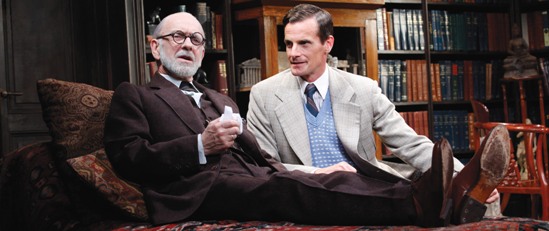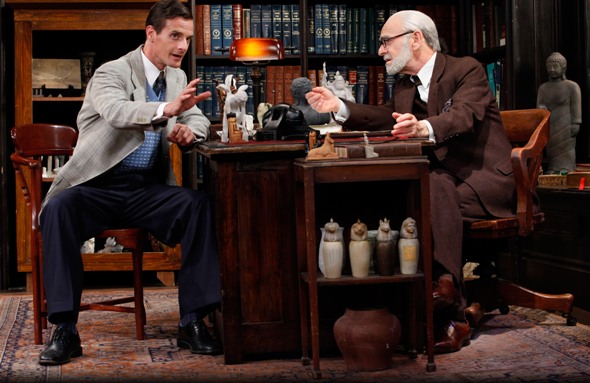In ‘Freud’s Last Session,’ an ailing analyst wrestles with death and a Christian convert
 Review: “Freud’s Last Session” by Mark St. Germain, at Mercury Theater through June 3 ***
Review: “Freud’s Last Session” by Mark St. Germain, at Mercury Theater through June 3 ***
By Lawrence B. Johnson
God, to playwright Mark St. Germain’s aging and ill but ever-skeptical psychoanalyst in “Freud’s Last Session,” is merely an expletive. And he invokes it fairly often.
 But to the old doctor’s vigorous young visitor, the Christian philosopher C.S. Lewis, the idea of God – and the absolute certainly of his existence – is fundamental to an understanding of life itself. In God alone, says Lewis, lies the possibility and indeed the essence of joy.
But to the old doctor’s vigorous young visitor, the Christian philosopher C.S. Lewis, the idea of God – and the absolute certainly of his existence – is fundamental to an understanding of life itself. In God alone, says Lewis, lies the possibility and indeed the essence of joy.
Thus, more than figuratively, is the stage set for these two brilliant thinkers to square off. Their fervent contest of wits lights up the Mercury Theater in a production of “Freud’s Last Session” featuring the same two actors that last season turned the play into an off-Broadway hit: Martin Rayner as Sigmund Freud and Mark H. Dold as C.S. Lewis.
Never mind that such an encounter between Lewis and the founder of psychoanalysis never, to anyone’s certain knowledge, actually took place. The time (September 1939), place (London) and historical circumstances of the two adversaries (Freud, age 83, terminally ill with cancer of the mouth; Lewis, 41, recently turned to Christ from atheism) are all accurate. Mark St. Germain’s Freud summons Lewis in response to some recent essays in which the younger man has urged the necessity of God.
At first, Freud’s interest in questioning Lewis personally appears to be purely intellectual, but we soon see a plausible connection with the analyst’s plan to end his own life. (The historical Freud committed suicide, with a physician’s assistance, in September 1939.) Freud knows he’s about to commit a great sin in killing himself, and one senses that he wants to test out one more time his conviction that the spirit expires with the body, that eternal damnation does not loom before him.
As their debate ramps up, it lays bare psychological issues on both sides before the final bell of a telephone call ends the match, perhaps in a draw.
Rayner’s Freud, crusty and suffering but still mentally acute, makes a splendid foil for Dold’s exuberant, initially deferential Lewis. Progressively, the debating ground that begins as Freud’s turf – the book-lined, sculpture-strewn office designed by Brian Prather — becomes neutral territory as these two formidable minds circle, thrust and parry. But there’s always the Couch, which Dold’s Lewis self-consciously tries to avoid landing on, even as Rayner’s penetrating analyst keeps nudging him, figuratively at least, in that direction.
The play is zinging in its mordant wit and sharp in its delineation of two vastly dissimilar personalities. It is a clever mind-game: diverting, often laughter-inducing, peppered with sly surprises, occasionally provocative. But profound, no. Profound is a play this one brings to mind — David Ives’ “New Jerusalem: The Interrogation of Baruch de Spinoza,” in which the 17th century Dutch-Jewish philosopher, facing excommunication for atheism, rebukes his inquisitors for challenging his belief in God. Belief has nothing to do with it, says Spinoza: God is logically unavoidable, necessary, the ultimate cause.
Lewis argues somewhat along that line, insisting the very notion of God implies necessity. He says revelation came to him out of the blue, one day while he was riding in the side compartment of a two-seat motorcycle. The analyst in Freud wonders aloud why he was huddled in the outer seat rather than driving the vehicle. Here, the playwright perhaps missed a bet. Freud might have taken his point a step further:
The war veteran Lewis describes how he was seriously wounded by a blast that splattered his best friend over his body. Lewis also shows signs of latent shock from the war, recoiling when an air-raid siren goes off, warning of a possible German air attack on London. Freud surely would have been familiar with the expression, “There are no atheists in foxholes.” The analyst imagines Lewis “huddling” in the sidecar but doesn’t spell out that small, walled compartment as a foxhole. It’s a curious foreshortening.
On the other hand, despite his own declaration of readiness to be done with life, Freud evinces no less fear than Lewis when the siren goes off. But he stands his ground about God, arguing that natural disasters and man’s endless inhumanity to man do not square with the idea of a benevolent God. Freud points to the impending war with Germany – he keeps turning the radio on for the latest on Hitler’s invasion of Poland – as well as his own cancer and the appalling deaths of a young mother and a small child. How do you explain God’s part in all this, he demands of Lewis.
But Lewis, as logical a thinker as Spinoza, also catches Freud — as the analyst recalls how, among the 30 operations he has undergone for his oral cancer, he once nearly died after surgery when his mouth filled with blood. He was saved by a slow-witted fellow patient who scrambled for help. What a joke, muses Freud, the great intellectual saved by an idiot. And who, replies Lewis, caused this joke?
Eventually – too late and too little, in my view – the conversation gets round to sex. Lewis declares the modern world has become preoccupied with sex, that it’s just not that important. Freud, the inventor of libido, replies that the manifold expressions of human sexuality, from infancy onward, cannot be overestimated in their influence on human behavior. And, by the way, he asks Lewis, are you married?
Brief as it is, the laconic exchange that follows, as each man makes pointed implications about unconscious sexuality in the other, produces some of the show’s most nuanced acting. In responses that are choked off, volumes are intimated. This fluent scene of silent desperation also bespeaks the elegant and precise work of director Tyler Marchant.
“Freud’s Last Session” offers neither proof nor conclusion for one side of this religious argument or the other. The debate as theater is the thing. It’s very good theater.
Related Links:
- Text and audio of C.S. Lewis on the subject of prayer: View it here.
- A daily jolt of Lewis: Go to Mere C.S. Lewis
- Other writings of Lewis: Go to the C.S.Lewis Reading Room
- A BBC clip of Sigmund Freud: Listen to his remarks on Dec. 7, 1938
- Sigmund Freud documentary “Exploring the Unconscious”: View it at YouTube
- Sigmud Freud: Internet Enclyclopedia of Philisophy
- Performance location, dates and times: Go to TheatreinChicago.com
Photo captions and credits: Home page and top: Recovering from a cancer episode, it’s Sigmund Freud (Martin Rayner) who ends up on the couch, tended by C.S. Lewis (Mark H. Dold). Upper right: Sigmund Freud (right, Martin Rayner) welcomes his guest C.S. Lewis (Mark H. Dold). Below: As the religious debate heats up, Lewis (left, Mark H. Dold) and Freud (Martin Rayner) press their points. (Photos by Carol Rosegg)
Tags: "Freud's Last Session", Brian Prather, C.S. Lewis, Mark H. Dold, Mark St. Germain, Martin Rayner, Sigmund Freud, Tyler Marchant












